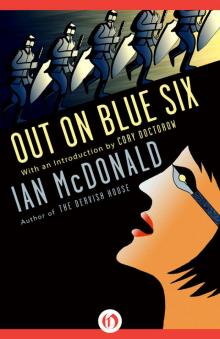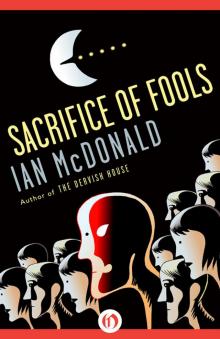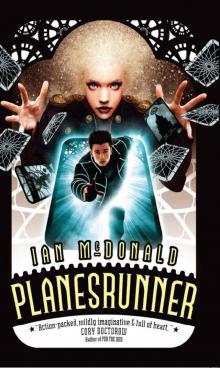- Home
- Ian McDonald
Planesrunner (Everness Book One) Page 13
Planesrunner (Everness Book One) Read online
Page 13
“His accent's very good.”
“He's got an English ma,” Sen called. Everett meekly took the pile of style into one of the changing coffins. It was almost as small and difficult as the toilet at the Sadler's Wells skyport. And the leggings ultimately were no different from his compression sports gear. While he pulled on the shirt, and the long shorts with lots of pockets in fantastic places, and adjusted the jacket lapels and the collar and drew the waist in tight, he heard Sen and the shop owner's conversation.
“Now where did you find that dolly dilly? Don't lie to your Dona. My ogles may be buggered, but even I can varda that omi ain't so.”
“Can't say, Dona Miriam; ‘cept that it is so, so.”
“Are you alamo?”
“Bona lacoddy. Bonaroo lallies. Fantabulosa dish. Had a varda when he was in the shower, didn't I?”
“And the chicken? Alamo?”
“Nante.”
“The more fool. Have you considered, dorcas, whether the dally chicken alamos polones at all?”
“You mean, omi-polone?”
“Dorcas, this is Hackney.”
“I do like girls,” Everett interrupted. “Sort of.”
There was a moment of silence; then two female voices exploded in laughter.
“Parlamo palari,” Dona Miriam said.
“Hama saba apan nij bh',” Everett said in Hindi. He emerged from the changing coffin.
“Bona,” Dona Miriam said. She clasped her hands in delight.
“Fantabulosa,” Sen said. Dona Miriam spun a full-length mirror. Everett beheld himself. The cavalry-style jacket, gold at the collar and at the cuffs and on the lapels, was very very good on him. The baggy shorts, all pockets and D-loops and zips and places to attach things, were pure street biker. Even the leggings underneath the shorts were an acceptable anonymous grey. He was hot.
“I just need one of those bandanas.”
Sen and Dona Miriam looked at each other, aghast.
“No no no bandana,” Dona Miriam said. “It's not so.”
“You need these,” Sen said, and plonked a pair of boots in Everett's arms. They were fantabulosa boots. Calf-length, complex, black, bad-ass. Everett pulled them on, did up the lacings and strappings and tightenings and made a turn in front of the mirror.
“Can I afford these?”
“No need,” Sen said. “From Sen.” Dona Miriam cleared her throat loudly. Sen walked slowly around Everett, so close he could feel the warmth of her breath, looking him up and down.
“Do I pass?” Everett said. “Do I look so?”
“Yes so,” Sen said. “Indeed so.”
She seized his lapels and pulled herself closer still. For a moment Everett thought she might kiss him, but she whipped a card out of nowhere and slipped it into the waistband of his pants. Dona Miriam shook his hand and palmed him a small wad of notes.
“Soft air, sweet voyaging, and a kind wind at your back,” she said.
After the smelly dinginess of Bona Togs, shaded and shadowy Churchwell Alley was blinding. Everett stepped out in his new togs, and for moment, just a moment, Hackney Great Port belonged to him. Well, perhaps not Hackney Great Port, maybe this bazaar of streets off Morning Lane. Well, maybe not the whole warren, maybe just this alley. Maybe not even this alley; just the few square centimetres of wet, greasy cobblestones under the soles of his new boots. Or even just his own skin. If you can say that much space belongs completely and utterly to you, that is a big say. He fished the Everness tarot card out of his waistband. An old line drawing of a peacock, squaring up and spreading its tail against its image in a mirror. The name of the card was Pride. And what's so bad about pride? Everett thought. Away from the fusty mustiness of Dona Miriam's shop, his togs recovered their new clothes smell, which is the greatest and rarest of perfumes because it only lasts until the first laundry.
With a shock he bumped into Sen.
“Everett Singh, do you think you can run in those new boots?”
“Why?”
“Because you need to in three, two, one!” And Sen was off like a bolt of ice from a crossbow.
Everett paused to pull the backpack safe and tight up high across his shoulders rather than down across his ass where he usually wore it, and in that hesitation he almost lost her. God, she was quick! He saw her look back. Her eyes went wide. Everett glanced back. The man with the Dutch accent, who had threatened him the night before: bearing down so fast and so close Everett could smell his breakfast on his breath. Everett spun on the heel of his new boot and ran. Sen? Where? All he could see were people, slipping and twisting out of his way.
A hand shot out from a dark opening in the shop fronts, grabbed Everett by the lapel, and hauled him into an alley so narrow his shoulders brushed brick on each side. Sen ran light and fast as a pale greyhound. She sensed every turn and twist, every discarded crate and cardboard box, every treacherous piece of fruit peel or slippery chip wrapper. Everett skidded on an orange skin, banged into the wall. He looked back. The Dutchman was behind him, so huge he filled the alley like a storm. The confined space had not slowed him at all.
“With me!” Sen yelled, vaulted a crate and, as Everett cleared it, pulled down a pile of crates and boxes piled on top of a big commercial trash bin. She grabbed the end of the bin and let her momentum spin her round and through an open doorway Everett would otherwise have missed completely. He grabbed the edge of the bin and spun round and through the door. Sacks with Chinese lettering on them, crates of soy sauce, pallets of noodles. Blocks of dried fish, massive and solid as concrete; a golden Maneki Neko cat, waving his paw. Sen plunged on, through a tiny, steamy, oil-stinky kitchen where chefs leaped up from their work, waving cleavers and shouting. Through a tiny tin-table restaurant, the day's newspapers from around the world pasted on the walls, men in long coats and leather caps with the earflaps folded down looking up from their bowls of noodles. Kids. Back to slurping noodles. Out the front door into the crowds.
“Out of the way!” Sen yelled. The crowds parted. She ran like a wild deer, but Everett's body-awareness was returning, his goalkeeper sense of spatial awareness. He had caught up. He was right on her shoulder. He saw her looking for alleys and rat-runs, clever twisting ways of escape.
“Left!”
She jumped over a beggar lolling in the mouth of an alley, warmed by steam venting from a kitchen extractor. One step behind, Everett hurdled the old beardy man in the coat tied with string, down another alley. He was still there, the Dutchman. He cleared the baffled old tramp. He moved well for a big man.
Ahead, a solid brick wall.
“Dead end,” Everett shouted. Sen darted in towards the wall, slapped a switch, then grabbed Everett and pulled him in to the wall. With a noise like the sky falling a ladder rattled down from the darkness above.
“Hold tight,” Sen whispered. The Dutchman bore down on them.
“Right, you little bastard!”
Sen kicked a latch on the ladder. The Dutchman looked up at the clang and clatter of moving metal above his head, then leaped back as the counterweight fell to the ground and the ladder shot up, snatching Sen and Everett out of his grasp. Everett saw the Dutchman's big, white face looking up at him, like the moon fallen to earth, dwindling as the emergency ladder lifted them away from him.
“Jump!” Sen shouted. She leaped into darkness.
“But—” No time for buts. Everett jumped into the unknown. He landed heavily on a metal gallery, invisible from street level, attached to the side of the building that formed the right wall of the alley. “Ow!” He had grazed knees and hands on the metal mesh. Sen was already away, so fast and light she seemed to be flying along the wall. She went up a zigzag staircase without breaking step. Everett followed her up onto the roof. Amazement stopped him. Above him, so close he could almost touch them, were the bellies of the great freight ships. He stood a long moment, turning, reading the names and the mottoes and the heraldic crests and the pin-up characters and the dragons and wyverns and a
ngels and demons and gods and mythological creatures that adorned the hulls.
“Oi! Don't dillydally. We's not out of it yet. The Iddler always sends his bassards in twos, coz on their own they so stupid they can't even find their own asses.”
Everett reluctantly broke away from the wonder.
“You'll get used to it,” Sen said. She noticed the blood on his grazed wrists. “Oooh, your poor hands. Want me to kiss ‘em better?”
Everett quickly thrust his hands into his armpits.
“So are you?” Sen asked.
“What?”
“Homy palone. It's okay if you are. I know loads of HPs.”
“Like I said, I like girls…”
“Sort of. You said ‘sort of.' Is you bibi? I's cool with bibi too.”
“I like girls. Okay?” Everett said. “Were you watching me in the shower?”
“Might have.”
“Well, you shouldn't. That's like…infringement of privacy.”
“No privacy on an airship, omi. And the water's rationed as well. Had to make sure you weren't using too much.” She smiled. “You're pretty fit for a comptator kind of guy.”
“I play football.”
“Do you? What position?”
“Goalie.”
“Oh, the other game.”
“Why, what's the game?”
“Rugby footie; now there's a man's game. Soccer, well, that's for posh boys and fruits, ain'it?”
“Not where I come from. On my world, soccer is a toff's game played by thugs, rugby is a thug's game played by toffs.”
“Don't much like the sound of your world, Everett Singh. Sounds awful soft. Well, come on then, posh boy. Keep up if you can.”
She turned and set off across the rooftops at a gentle lope. Everett followed two steps behind, easily falling in with her rhythm, up one side of the sloping roofs, down the other, past smoking chimney pots and steaming vents that smelled of garlic and ginger and fish, ducking beneath spiderwebs of fizzing, sparking electrical cables. Rickety wooden gangways had been built over the alleys. Sen, who had grown up in the three-dimensional world of the airships, where up and down were as easy and natural as left and right, ran heedlessly across them. Everett looked down. Far below his feet were the canopies and stall umbrellas of Morning Lane bazaar. Heads, hats. Dizziness pulled at him; then he felt a hand grab his and pull him onto the next roof.
“Rule number one: don't look down,” Sen said. “Trust your feet.” Two blocks over they came to a gap between the roofs where the bridge had rotted and fallen.
“Think you can make it?”
Everett sized up the distance, the weight in his backpack, the unfamiliarity of his footwear. He had passed two tests already: at Bona Togs when he trusted Sen and Dona Miriam to dress him; in the chase through the lanes and tunnels, when he had to trust that Sen could get them out of a blind alley.
“I think so.”
“Bona. Remember—”
“I won't look down.”
Sen seem to fly over the gap in slow motion. She landed light and agile as a monkey. Then it was Everett's turn. The only run up was down the steep pitch of the roof; the only space for takeoff the width of a gutter. Miss the footing…
“Trust your feet,” Everett muttered. Four strides, Dr. Quantum slapping hard against his back. He hit the takeoff spot. And he was up. And over. He landed hard, soles and fingers scrabbling at the slippery slates, sending dislodged tiles slithering down into the street. The voice of an angry stall-holder roared up at them, furious at ripped canopies and smashed wares.
“Not bad,” Sen said.
“Is there much more?” Everett panted.
“Nah. See that stair head over there? That'll take us down to the Downs Arches and we're home and hosed.” The metal stairway zigzagged down the side of an old red brick warehouse. BORDEN'S STEEL-MILLED PORAGE OATS was painted in two-metre-high letters on the wall, faded with years of east London weather. The elevated railway ran above the street, the staircase connected with the platforms, but Sen led Everett down under the dripping steel. A train roared overhead. She pushed open the street gate. A figure stepped into the space.
“How now,” a guttural man's voice said. Everett recognised the voice's owner: the Dutchman's partner of the previous night. Everett saw Sen tense herself, as if she might charge him, head butt him. Guttural Man read the move too. He clicked his tongue; his hand jerked. There was an ugly black gun in it.
“Hey ho,” said a voice above. Everett looked round. The Dutchman leaned over the railings at the el station. He was out of breath but grinning.
“Well, I can only assume that you didn't deliver my boss's message to your captain,” Guttural Man rasped. His lungs rattled with phlegm. “Now that's very unprofessional, and a bit of a personal insult—that you think so little of my boss that you don't even pass on important messages. Well, we shall have to send a clearer message this time. Polone, you come with us. You, omi, you tell Captain Sixsmyth that if she wants to see her dear daughter again, come and talk to us at the Knights. And tell her not to fanny about coz we might just start deducting interest, you know? With a knife.”
“You touch me, you die!” Sen spat.
“'And the King shall answer and say unto them, Verily I say unto you, Inasmuch as ye have done unto one of the least of these my brethren, ye have done unto me,'” a voice suddenly declaimed in Southern States, preacher's drawl. Guttural Man half turned. Sharkey was behind him, close enough that his breath stirred the hairs on the back of Guttural Man's neck. Everett couldn't see how he had got there, or where he had come from, but the American took a step back into the street and flicked back the tails of his long, half-caped coat. Light glinted from metal concealed in clever pockets in the lining. Sharkey's hands moved faster than thought. An ivory handled sawn-off shotgun appeared in each fist. He gestured with a gun for Guttural Man to step aside. Guttural Man looked at his own weapon. Sharkey clicked his tongue in disappointment.
“'Verily, a fool hath no delight in understanding.'” He raised the guns and levelled them at Guttural Man's head. Guttural Man cleared the gate. Sen and Everett clattered down the steps to join Sharkey.
“Now, sir. Your piece. Set it down now. On the step.” Guttural Man let the gun dangle from his finger by the trigger guard. He bent slowly, never taking his eyes from Sharkey and his ivory shotguns, and set it down on the metal step. “And step away, sir.” Sharkey swung one gun up to draw a bead on the Dutchman on his platform. The other he kept trained on Guttural Man's face. “Miss Sen, if you please.”
Sen scuttled in and retrieved the ugly black gun. Everett noticed that she seemed comfortable with it. She undid the front of her jacket, buttoned closed against a Hackney December, slipped in the gun, and closed it up again.
“Thank you, gentlemen,” Sharkey called out. “Our business is concluded. Good day to you both.” He tipped the brim of his hat with the barrel of his shotgun.
“We'll get you, with your fancy-dan fiddle-dee-dee accent and your Bible quotes. Your captain owes us. You owe us.”
“'Though I speak with the tongues of men and of angels, and have not charity, I am become sounding brass, or a tinkling cymbal,'” Sharkey proclaimed. But he kept a shotgun sloped over each shoulder until they had all reached the end of the road. As the crowd thickened, Sharkey slipped the guns back into the lining of his coat.
“Do you generally go around with two guns in your coat?” Everett asked. He'd stowed away on an airship; jumped through a Heisenberg Gate; conned his way through a strange, parallel London; evaded Charlotte Villiers and her goons; but this was the coolest thing he had ever seen.
“Consistently, sir. ‘Redeem the time, because the days are evil. Take ye heed every one of his neighbour, and trust ye not in any brother: for every brother will utterly supplant, and every neighbour will walk with slanders. For I will surely deliver thee, and thou shalt not fall by the sword, but thy life shall be for a prey unto thee: because thou hast put thy tr
ust in me, saith the Lord.'”
“Do you know all the Bible?” Everett asked.
“Every bit of it,” Sen interrupted. “Old Testament best. It sounds better.”
“'Thy word is a lamp unto my feet, and light unto my path,'” Sharkey quoted. “'Hear the word of the Lord, ye who tremble at his word.' Psalm 119, verse 105, and Isaiah 66, verse 5. We have not been properly introduced sir. Our previous meeting was a tad strained. I am Miles O'Rahilly Lafayette Sharkey, citizen of the Confederated States of America; weighmaster, soldier of fortune, adventurer, gentleman: Atlanta is my home and Heaven my expectation.” He swept off his hat. His hair was long and streaked with silver, though Everett guessed him to be in his mid thirties. Everett took the offered hand firmly.
“Everett Singh, sir.” Sharkey's way of talking was catching. “Goalkeeper, mathematician, traveller, planesrunner.”
Miles O'Rahilly Lafayette Sharkey's left eyebrow lifted a millimetre. He bowed.
“Honoured, sir.”
Everett rode the lift line up through the inner organs of Everness. Beneath him, the loading deck where Sharkey was in careful negotiations with a stevedore over a consignment of containers bound for St. Petersburg. Above him, like clouds, the ranks of gas cells, and Sen, a body-length above him, riding the line high with the grace and ease of an angel. She grinned down at him. Thinking in three dimensions was easy—he had had to think in seven dimensions to fold Tejendra's random Heisenberg jump addresses into the Infundibulum. Living in three dimensions—effectively on the inside of a huger, hollow object—that was much less easy. But he was getting the feel of it, learning the timings and the orientations and to think that the shortest distance between two points was often across, not around. He thought of it as minding a goal the size of an ocean liner. Sen swung in over the central catwalk and dropped lightly to the mesh. Everett was right behind her.
Sen wanted to give him a tour of the ship before the weigh-in—the second time he had heard that faintly ominous phrase that day. She took him round the crew quarters first—galley you know, captain's ready room you know; showed him his own little cabin—latty was the Airish-speak; helped him sling his hammock and showed him how to use it without rolling straight out again. She had even graced him with a glimpse into her own latty. Everett got an impression of tubes of cosmetics crowding every surface, strewn underwear (rather small, it seemed to Everett) and posters of rugby players with their shirts off. The bridge: the heart of the ship. It was smaller than Everett had thought; with all the crew at their stations it would have been crowded. But the view from the floor-to-ceiling window was compelling: a winter afternoon in Hackney Great Port, airships drifting across the purple-and-gold December skyline, plumes of steam and smoke rising from along the edge of the world. Everett barely noticed the instruments and tools of airship command; the steering yokes, the lift levers, ballast pumps, the joysticks that trimmed the attitude, the binnacle, the computer displays glowing behind their magnifying monocles, the banks of closed-circuit monitors keeping eyes on all of Everness's huge body, inside and out. Then down a spiral staircase, bent double in the crawlspaces beneath the cargo deck, among the batteries; banks and banks of them wedged so close Everett could hardly squeeze between them. They were warm and humming and filled the claustrophobic crawl-ways with the thrilling, spicy smell of electricity. Everness, like all airships of her class, ran on electricity. In dock at Hackney Great Port she was recharging from the port grid, but she was configured to charge up from any available electrical source.

 Empire Dreams
Empire Dreams The Menace from Farside
The Menace from Farside Luna: Moon Rising
Luna: Moon Rising Moon Rising
Moon Rising Desolation Road dru-1
Desolation Road dru-1 Empress of the Sun
Empress of the Sun Ares Express dru-2
Ares Express dru-2 Tendeléo’s Story
Tendeléo’s Story River Of Gods
River Of Gods Luna
Luna![Cyberabad Days - [River of Gods 02] Read online](http://i1.bookreadfree.com/i1/03/29/cyberabad_days_-_river_of_gods_02_preview.jpg) Cyberabad Days - [River of Gods 02]
Cyberabad Days - [River of Gods 02] Clarkesworld Magazine Issue 76
Clarkesworld Magazine Issue 76 Brasyl (GollanczF.)
Brasyl (GollanczF.) Scissors Cut Paper Wrap Stone
Scissors Cut Paper Wrap Stone Chaga
Chaga Time Was
Time Was Cyberabad Days
Cyberabad Days Be My Enemy
Be My Enemy Changa
Changa King of Morning, Queen of Day
King of Morning, Queen of Day Out on Blue Six
Out on Blue Six Sacrifice of Fools
Sacrifice of Fools Desolation Road
Desolation Road Luna--Wolf Moon--A Novel
Luna--Wolf Moon--A Novel Planesrunner (Everness Book One)
Planesrunner (Everness Book One) Ares Express
Ares Express